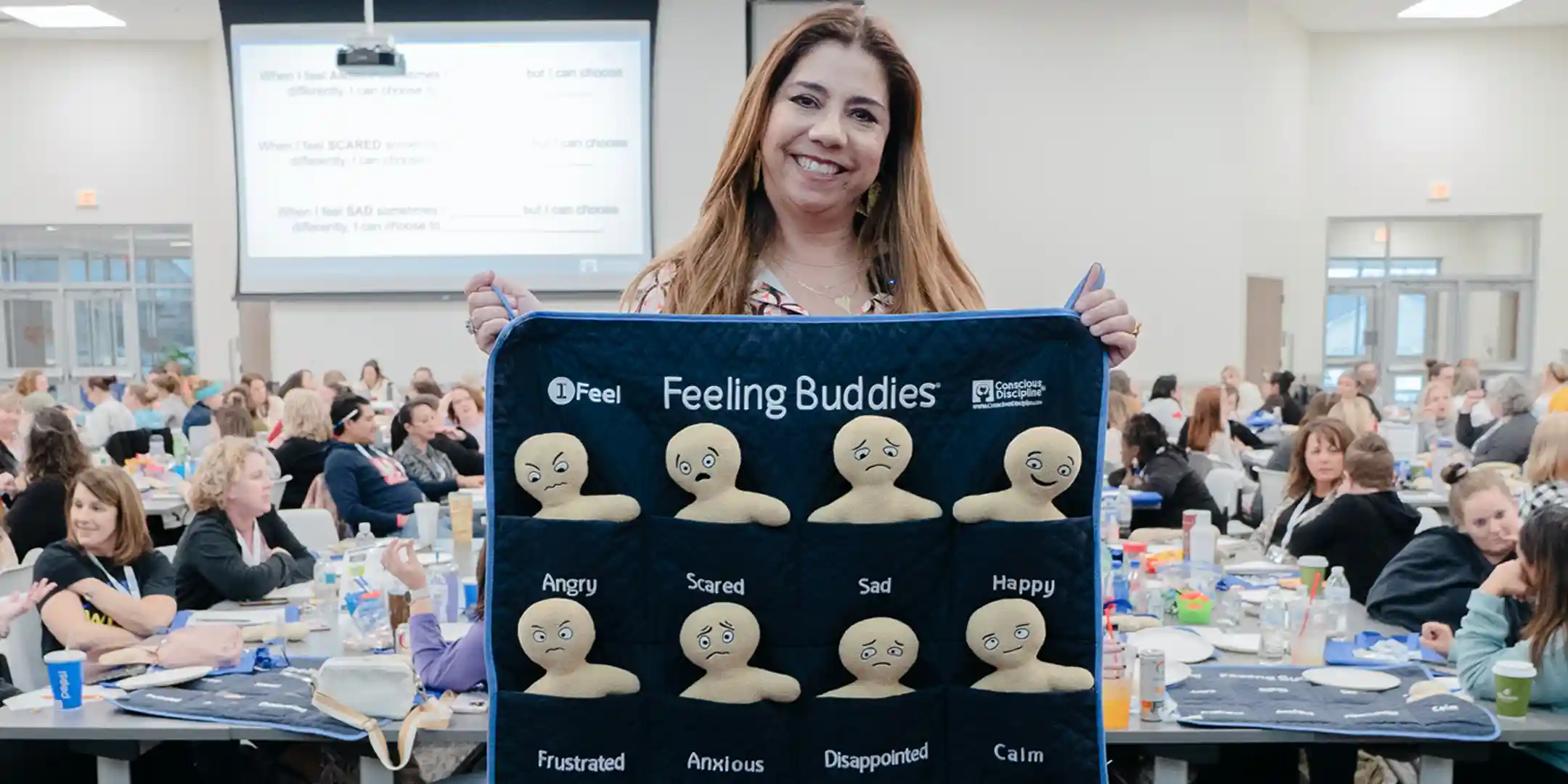Conscious Discipline’s Feeling Buddies: A Workshop Based on an Education Tool for a Lifetime of Self-Regulation
A Lack of Self-Regulation Methods
Lety Valero had an eye-opening realization as an adult: she realized she did not know how she felt. As someone with a graduate degree in International Education and a long-standing career in education and administration, she found her lack of awareness of her own emotions and feelings shocking to uncover. Lety approached this revelation with curiosity, and it led her to the defining question that put the wheels in motion for one of the greatest foundational tools for self-regulation we have: the Feeling Buddies Self-Regulation Toolkit. She asked herself, “If I can’t identify my own emotions and engage in self-regulation, how can I possibly expect a child to know how to regulate theirs?”
Staggering research backs up Lety’s concern: 40% of children are missing the skill of self-regulation, and it is the number predictor of lifelong success. Children need us to teach this essential skill, and many adults could use some help developing it, too!
The Pitfalls of Denying Emotion in the Classroom and in Life
Nothing good comes from the suppression or denial of emotions. “As early as elementary school, the avoidance of strong emotions results in academic underperformance in boys.” Psychologists have found that children who deny emotional vulnerability are also more likely to become adolescents who engage in health-risk behaviors, such as substance use.” (Greater Good, Berkeley)
Lety has witnessed the pitfalls of ignoring or denying one’s emotions within herself, and in her schools and classrooms. “When we deny our feelings or refuse to acknowledge them, they often become something else, something that may damage our relationships, our self-esteem, our ability to succeed and our overall quality of life,” she says. Aside from traditionally risky behaviors like alcohol and drug abuse, there are newer risks such as addictions to technology and online shopping that may emerge in attempts to soothe the uncomfortable feelings associated with suppressed or unrecognized emotions.
How do we change our language and narrative from, “Stop your crying,” and our punitive responses of punishing an outward display of emotion without offering an alternative way of regulating them?
Emotions are Our Friends
“As adults,” says Lety with the deliberate poise and warmth she is known for, “we’ve achieved the appropriate brain development to have the ability to self-regulate,” she pauses for emphasis, “But children? Children have not.”
If children lack the meta-cognition to regulate themselves, we must coach them in strategies for self-control. Dr. Daniel Siegel and Dr. Becky Bailey have both said, “You’ve got to name to tame it.” But self-regulation requires far more than labeling the emotion. The Feeling Buddies Self-Regulation Toolkits are an all-in-one resource that provides powerful self-regulation tools for the classroom. A smaller family edition does the same for one-on-one use in the home.
The Feeling Buddies center around a set of gingerbread-type plush dolls with varied and expressive emotions that make each feeling easy to identify. The accompanying materials support adults in coaching children through Conscious Discipline’s Five Steps for Self-regulation. The steps include identifying it (I am), welcoming it (I calm), befriending it (I feel), soothing it (I choose), and resolving the core challenge behind the emotion. (I solve). There are eight Feeling Buddies in all, outwardly expressing the emotions angry, scared, sad, anxious, happy, disappointed, frustrated and calm. In times of upset, the adult coaches the children in identifying the emotions they’re feeling by using the dolls. As the children talk the dolls through the self-regulation process, they also begin to instill an inner voice of self-regulation. This becomes the foundation for lifelong inner speech that is healthy, constructive, and responsible rather than steeped in denial, guilt, shame, or blame.
“Befriend your emotions, “Lety says, “They are speaking to us with very important messages. Your feelings are not your enemy.”
Learning to befriend one’s emotions from an early age not only impacts self-regulation efforts, but also encourages empathy and enhances communication. When you can identify an emotion within yourself, you are more likely to be empathic and able to dialogue with someone exhibiting the same emotion. As we believe at Conscious Discipline, “What you offer to others, you strengthen in yourself.” The Feeling Buddies are designed for use with children ages 4-8, but the effect of their teaching is long-lasting.
From Infants to In-laws: Self-Regulation Methods for Everyone
You may not find a collection of plush dolls in a middle school, high school, or college classroom- but the foundational concepts in the Feeling Buddies can be modified for all ages, even throughout adulthood. In fact, Lety uses the strategies and skills learned through the Feeling Buddies with herself daily. She uses phrases such as, “I’m going to walk with Frustration for a while,” to self-identify how she is feeling and trouble-shoot her next steps. The skills and strategies for self-regulation can follow a student throughout their academic career and their life.
It is impossible to self-regulate when we cannot identify the emotion we are experiencing. When we use the Feeling Buddies as foundational tool in the classroom, they provide the training for teachers that’s necessary for them to learn the self-regulation process for themselves so they can then teach it to children. After all, we cannot teach skills we do not know how to apply ourselves. In this way, Feeling Buddies use enhances adult self-regulation skills while also setting up every child for self-regulation success.
Conscious Discipline hosts events specifically designed to help adults increase their self-regulation so they can better teach this essential life skill to children. The next of these events, Self-Regulation with the Feeling Buddies, occurs January 23 and 24 in Houston, TX. Join Lety and Anne Hoff at this transformative Houston teacher event where you will:
- Learn how to implement Feeling Buddies and the Safe Place, the centerpiece of your self-regulation program.
- Reduce discipline referrals as you and your children develop the practice of self-regulation within your classroom.
- Create a caring, safe, and healthy environment for optimal learning.
- Discover ideas and inspiration to prepare your own classroom and/or school Safe Place, where children can go to change their inner state from upset to calm using the self-regulatory skills you’ll teach them.
We hope to see you there.
Resources:
Upcoming Events
- Conscious Discipline Institute in Orlando, FL: Summer Educator Event, 7/7-12
- Conscious Discipline Institute in Kansas City, MO: Summer Educator Event
- Elevate Conscious Discipline: Teacher Conference in Orlando
- Conscious Discipline Institute in Asheville, NC: Summer Educator Event
- Conscious Discipline Advanced Institute in Navasota, TX: Advanced Educator Event
- Conscious Discipline Institute in Chicago, IL: Summer Educator Event




